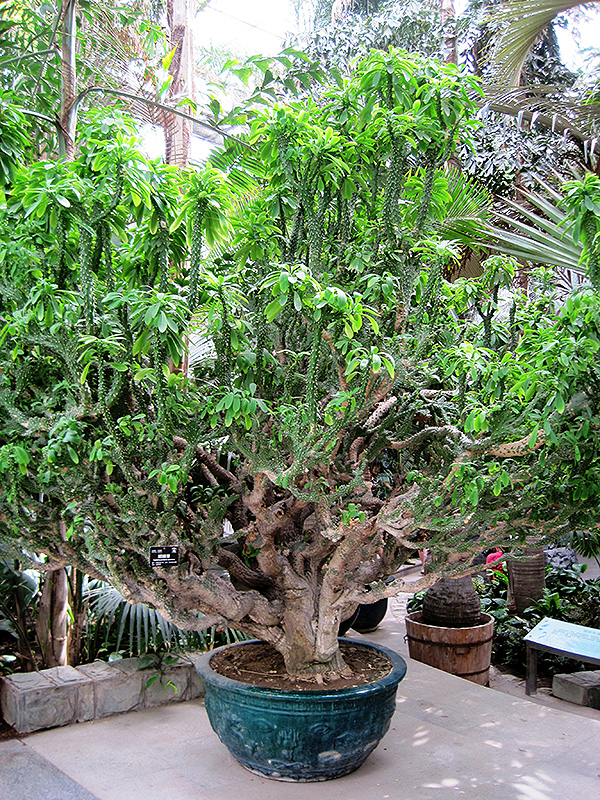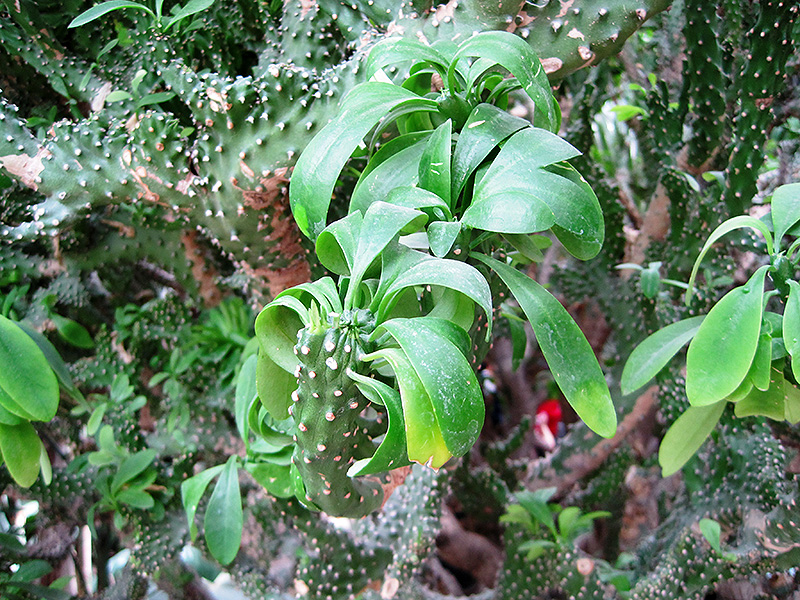PLANT FINDER
Crested Oleander-Leaved Cactus
Euphorbia neriifolia 'Cristata'

Crested Oleander-Leaved Cactus
Crested Oleander-Leaved Cactus
(Photo courtesy of NetPS Plant Finder)

Crested Oleander-Leaved Cactus foliage
Crested Oleander-Leaved Cactus foliage
(Photo courtesy of NetPS Plant Finder)
Height: 15 feet
Spread: 10 feet
Sunlight:
![]()
Hardiness Zone: 8b
Other Names: Indian Spurge Tree
Description:
An attractive, bold plant for a sunny border; narrow green foliage atop fan shaped crests that will split and branch; flower bracts are showy atop the crests; adds a truly exotic dimension to the garden
Ornamental Features
Crested Oleander-Leaved Cactus is primarily valued in the landscape for its ornamental upright and spreading habit of growth. It is clothed in stunning clusters of red flowers with chartreuse bracts held atop the branches from late winter to mid spring. It has attractive green deciduous foliage. The succulent narrow leaves are highly ornamental but do not develop any appreciable fall color.
Landscape Attributes
Crested Oleander-Leaved Cactus is an open multi-stemmed deciduous shrub with an upright spreading habit of growth. Its average texture blends into the landscape, but can be balanced by one or two finer or coarser trees or shrubs for an effective composition.
This is a relatively low maintenance shrub, and should only be pruned after flowering to avoid removing any of the current season's flowers. Deer don't particularly care for this plant and will usually leave it alone in favor of tastier treats. It has no significant negative characteristics.
Crested Oleander-Leaved Cactus is recommended for the following landscape applications;
- Accent
- Mass Planting
- General Garden Use
Planting & Growing
Crested Oleander-Leaved Cactus will grow to be about 15 feet tall at maturity, with a spread of 10 feet. It has a low canopy with a typical clearance of 2 feet from the ground, and is suitable for planting under power lines. It grows at a medium rate, and under ideal conditions can be expected to live for 40 years or more.
This shrub should only be grown in full sunlight. It prefers dry to average moisture levels with very well-drained soil, and will often die in standing water. It is considered to be drought-tolerant, and thus makes an ideal choice for xeriscaping or the moisture-conserving landscape. It is not particular as to soil pH, but grows best in sandy soils. It is highly tolerant of urban pollution and will even thrive in inner city environments. This is a selected variety of a species not originally from North America, and parts of it are known to be toxic to humans and animals, so care should be exercised in planting it around children and pets. It can be propagated by cuttings; however, as a cultivated variety, be aware that it may be subject to certain restrictions or prohibitions on propagation.
A NetPS Plant Finder tool
